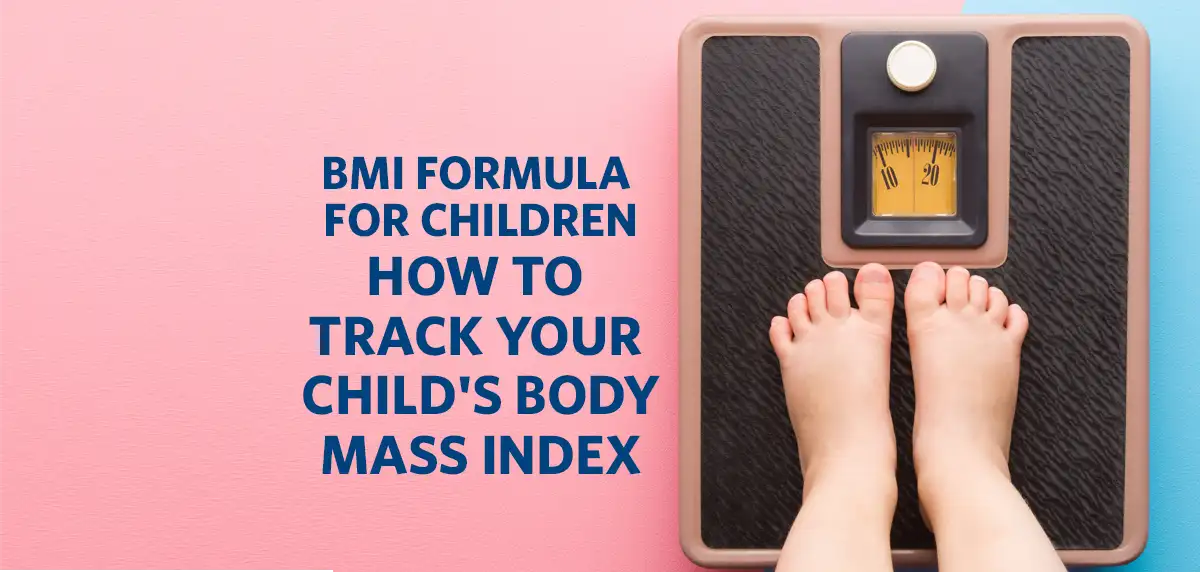Understanding children's Body Mass Index (BMI) is important to assess their growth and overall health. BMI is a simple calculation made using an individual's height and weight to estimate their body fat. Calculating your child's BMI will help you assess whether your child falls within a healthy weight range. In this article, we will explore how BMI is calculated for children, what the results mean, and why BMI is an important indicator to help support a child's well-being and development.
The Importance of Tracking Your Child’s BMI
Body Mass Index (BMI) is a useful tool for determining whether an individual’s weight is appropriate for their height. It helps classify a person as underweight, normal weight, overweight, or obese. For children, monitoring BMI is especially important, as it allows parents to check whether their child’s weight aligns with the recommended standards for their age group.
Parents can closely monitor their child’s BMI to identify potential health concerns early. High BMI in children increases the risk of conditions, such as sleep apnoea, joint problems, type 2 diabetes, and high blood pressure, later in life. Conversely, a low BMI may indicate nutritional deficiencies and can lead to developmental delays.
Here’s why you should track your child’s BMI:
- Tracking ensures that your child maintains a healthy lifestyle as they develop and grow older.
- Tracking BMI can help your child manage their health and avoid any chances of obesity in adulthood.
- Regular tracking will help you identify any early indicators of health problems.
- Tracking BMI encourages not only children but the entire family to take up a healthier approach towards life.
How is BMI Calculated?
The BMI formula for children is pretty simple:
BMI = weight (kg)/ height (m)
All you need to do is measure your child’s weight and height to calculate their Body Mass Index according to the BMI formula for children mentioned above. Remember to:
- Weigh your child on a weighing scale. Ensure your child is barefoot and not wearing heavy outfits to obtain accurate readings.
- Measure your child’s height by having them stand barefoot against a wall. Instruct them to keep their head, back and heels on the wall. You can use a measuring tape to note their height in metres.
- Use the formula given above to ascertain your child’s BMI. You can use a BMI calculator to avoid manual calculation errors.
Interpreting BMI Results
Health organisations, such as the World Health Organisation (WHO) and Centres for Disease Control and Prevention (CDC), have produced charts to help determine BMI percentile rankings. Here’s how the percentiles are categorised:
Underweight:
BMI is less than 5th percentile
Normal weight:
BMI falls between the 5th and 85th percentiles
Overweight:
BMI score falls between the 85th and 95th percentiles
Obese:
BMI is more than the 95th percentile
In simple words, if a child’s BMI is around the 90th percentile, it means that 90% of other children from the same age and gender group have a lower BMI, suggesting that the child is overweight.
How Can I Help My Child Maintain a Healthy BMI?
Here are a few tips that can help your child maintain a healthy BMI score:
Balanced Diet:
A balanced diet rich in fruits, vegetables, lean proteins, whole grains, and healthy fats is essential for your child’s health. Limiting processed foods, sugary drinks, and unhealthy fats helps prevent empty calories and supports overall well-being.
Family Meals:
Parents must encourage family meals as a way to motivate their children. Once children observe that their parents are also leading a healthy lifestyle, they will feel motivated to do the same.
Control Portion Sizes:
Too much of anything can be harmful. This is why parents must monitor portion sizes to prevent their children from overeating. Parents can use smaller plates to help children understand when they are full.
Exercise:
Children must engage in an hour's worth of physical exercise each day. Swimming dancing, playing their favourite sports or just going for a walk can keep those calories burning. Parents must control their children’s screen time to promote physical activity.
Sleep:
Less sleep can lead to weight gain. Make sure that your child sleeps for at least eight hours every night.
Promote a Healthy Lifestyle:
Make sure you’re talking to your kids about the importance of being healthy. Try and avoid any negative weight-related words that can affect your child’s self-esteem.
Obesity is a chronic condition that can impact your child’s health both now and in adulthood. Regularly tracking your child’s BMI helps you monitor their growth and overall well-being. Parents are encouraged to calculate their child’s BMI regularly to identify potential weight concerns early and take timely action. Ensuring a lifestyle that includes physical activity, a balanced diet, and a positive self-image promotes both health and happiness. Additionally, understanding the importance of BMI in a life insurance policy is essential for long-term health and financial planning for your family.
Disclaimer:
The information presented above is not meant to be a substitute for medical advice. Any suggestions mentioned should be considered for general use only. For expert guidance on any health ailment or medical issue or any treatment/procedure, please consult a certified medical professional.





















